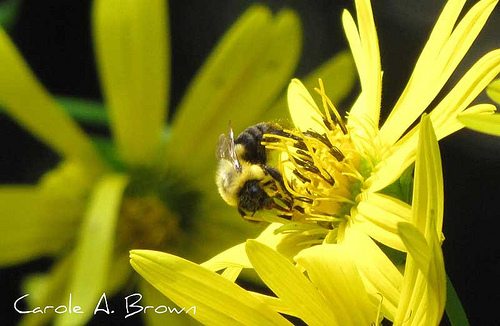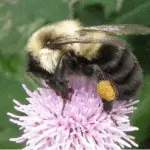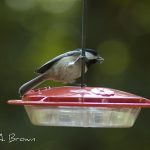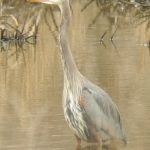I received an email from my friend, Lisa Gustavson at Get in the Garden, which, while sad, gives us an opportunity to to come together to brainstorm solutions. The email said:
At first I don’t think anyone really “noticed” them. As others have begun to plant gardens etc. the populations are increasing and the neighbors aren’t thrilled. Bugs=bad enough, wild animals=BAD. I’m working to educate them, I’ve been on a soapbox for months. I’ve seen possums shot (yes, quite illegal in our town) and woodchucks trapped with the same fatal intention. We were able to get the trap and transport the animals to a local park instead. I was aware at the time that the odds of survival were not good, but not good is better than none.
I’m stumped! We’re in what was once an agricultural town which is now undergoing a population explosion. Of course the natural habitats of many animals has been destroyed and they’re looking for a safe place to live. Our yard is not huge (1/2 acre total) but being the only one on the street with mostly gardens it naturally attracts everything. How do we create a peaceful co-existence here? I can’t stand the thought that every animal that shows up is going to be removed, trapped or killed if we’re not here to stop it. Any advice is greatly appreciated…though we’ve been living with “critters” for a few years I think we’ve been found out.
Thanks for taking the time to read this, I’d love to hear any ideas you have!
My first response: I would be so thrilled to see a fox in my neighborhood!
Why do we kill what we do not like?
I am very saddened that we live in a world where our first response is to kill what we don’t understand, don’t like, or are afraid of. We see this tendency in bug zappers, pesticides, and shooting opossums, coyotes, wolves, snakes, and raccoons. We say “That critter is some kind of inconvenience to me, so let me kill it.”
We are killing in more subtle ways, too. In our continual march toward “progress” and “development” we are killing all manner of wildlife by destroying their habitat and leaving them no place to go.
All too often gardeners who want to reverse this trend by giving something back to wildlife are met with resistance, anger, and rules to prohibit this behavior.
I have a friend who has been fighting her township for years because she has a wildflower garden in her front yard. Because it is not the traditional lawn, her neighbors continue to file complaints against her with the township, who in turn proceed to levy fines and directives to get rid of the “eyesore which may harbor rats.” Never mind that this meadow is full of many different kind of beautiful butterflies from spring through fall.
How do we educate our neighbors, and help them to at least respect wildlife if not learn to love it?
Here’s some things I’ve done to encourage more respect for wildlife:
When I divide my native perennials, I make gifts for my neighbors and always tell them “This one is really great for butterflies” or “Hummingbirds just love this” They may not care about that, but they appreciate the gift and plant them in their yards.
I talk to the neighborhood kids and show them birds nests, baby birds, butterflies, hummingbirds, or any of the other critters in our neighborhood. Kelly Senser talked about nurturing the Sense of Wonder with her kids, and I try to do that with all of the children in the neighborhood. Adults may be less likely to kill what their children love.
Most of my neighbors use Facebook, and ironically we often have more communication this way than any other way, especially in the winter. My status updates are often about the wildlife in my yard: the first hummingbird of the season is at my feeder; there is a pair of Eastern Screech Owls calling back and forth; a Monarch Butterfly emerged from its chrysalis today, etc. Some of my neighbors have been inspired to ask me how they can see wildlife in their yards, too.
I lobby the city to stop mowing the medians and roadside edges and especially to stop spraying them. Seems like a win-win to me: the city saves money and wildlife gets some habitat. We have won that argument several times.
More From Ecosystem Gardening:
Submit your review | |








